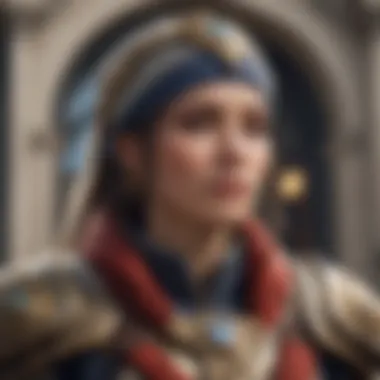Exploring Faith and Spirituality in Destiny 2


Intro
The intersection of faith and gaming often remains under-explored. In the case of Destiny 2, a popular first-person shooter developed by Bungie, the subtleties of belief systems, spirituality, and community engagement present a complex landscape. Various elements of the game come together to depict narratives not solely focused on combat but on deeper philosophical and emotional queries about existence, purpose, and connection.
To provide a structured exploration of these themes, this article will navigate key components of Destiny 2. We will delve into the gameplay mechanics, the intricacies of character development, and the collaborative spirit within the community. Our investigation aims to lay bare how these elements contribute to a nuanced understanding of faith within the digital realm.
Preamble to Faith in Gaming Context
In exploring the intricate relationship between faith and gaming, it is essential to understand the foundational aspects that give meaning to this discourse. Faith, in its various forms, has been a constant in human history, shaping cultures, ideologies, and personal identities. Within gaming, particularly in a complex narrative environment like Destiny 2, this concept of faith manifests in ways that provoke thought on existential questions, the nature of good versus evil, and the unfolding of human connections.
Defining Faith and Its Relevance
Faith can be defined as a strong belief in something, often without proof. It can involve religious experiences, spiritual journeys, or a mere belief in a cause or community. In the context of gaming, particularly Destiny 2, faith may not strictly adhere to traditional religious connotations, but instead, reflect themes of loyalty, trust, and purpose among characters and players.
This concept is relevant as gamers often gravitate towards narratives that resonate with their personal beliefs or challenge their perspectives. In Destiny 2, players step into roles marked by a sense of guardianship and purpose which echo deeper ideals of faith. As narratives unfold, they provide a framework to explore how individuals confront adversity, moral dilemmas, and a search for meaning within a digital realm.
By examining these themes, one can discern how gaming is not just an entertainment medium but also a form of modern storytelling that parallels mythological and religious discourse.
The Rise of Gaming as a Cultural Phenomenon
As society has engulfed itself in digital culture, gaming has emerged as a dominant form of contemporary art. Its rise can be attributed to several factors:
- Accessibility: The availability of gaming platforms has enabled a broader audience to engage with video games, making them a common pastime.
- Immersive Experiences: The technological evolution has led to more captivating and immersive environments. This evolution allows players to create connections to the storyline and characters similar to traditional narratives.
- Community Dynamics: Online multiplayer features allow for social interactions and the formation of communities. This aspect mirrors religious or communal gatherings, fostering a sense of belonging among gamers.
These factors together elevate gaming beyond mere play. Instead, it is evolving into a cultural phenomenon that encapsulates shared values, emotional bonds, and philosophical explorations.
Understanding the complex landscape of faith within this milieu encourages a deeper appreciation for how Destiny 2 and other games operate on multiple levels, conveying meanings that extend beyond the screen.
Overview of Destiny
In the context of this article, the overview of Destiny 2 serves a crucial role in examining how the game intricately weaves faith-related themes throughout its structure and gameplay. By understanding Destiny 2 as not just a video game but also a platform for complex narratives, we can better appreciate the spiritual elements it presents. This section highlights fundamental components such as game mechanics, narrative depth, and overall structure, which contribute to the resonant themes of belief and community.
Game Mechanics and Structure
Destiny 2 is built on a captivating blend of first-person shooter mechanics and role-playing elements. This hybrid model invites players to immerse themselves in an expansive universe where exploration and combat are enhanced by character progression systems. The game is divided into various planets and locations, each containing unique missions, quests, and challenges. This structure allows for both solo and cooperative gameplay, fostering a sense of achievement and collaboration.
The mechanics of gameplay encourage players to form clans and engage in raids, which demand coordination and teamwork. Such gameplay structures resonate with the idea of community, akin to a shared belief system where players support one another in their quests.
Narrative Themes in Destiny
Narrative themes in Destiny 2 are significant in exploring the layers of faith and belief systems within the game. The overarching storyline revolves around the struggle between the Light and the Dark, representing good versus evil. This dichotomy parallels many religious and philosophical concepts of faith. The guardians, who act as protectors of humanity, embody the ideals of self-sacrifice and perseverance, which can reflect various religious narratives.
Moreover, throughout the game’s many expansions, players encounter rich lore that develops the world and its characters further. Characters like Ikora Rey and Cayde-6 offer depth, grappling with their purposes and destinies. These character arcs often present moral dilemmas and spiritual questions that can resonate deeply with players, prompting reflections on their own beliefs.
"The narratives in Destiny 2 not only engage players but also allow for exploration of spiritual themes that echo through culture and religion."


Narrative Elements of Faith in Destiny
The exploration of faith within the context of Destiny 2 provides an enriching narrative layer to the game. Faith serves as a complex, multifaceted concept that runs deep through the game’s characters, mechanics, and community interactions. This section aims to unfold the various narrative elements that illuminate how faith manifests in diverse forms throughout the game. By analyzing character arcs, the symbolic significance of light and dark, as well as the game's intricate lore, readers can grasp how these elements combine to create a cohesive belief system that transcends mere gameplay.
Character Arcs and Spiritual Journeys
In Destiny 2, the personal growth and challenges faced by the characters depict profound spiritual journeys. Each Guardian represents a unique path guided by intrinsic beliefs and motivations. Notably, characters like Osiris experience transformation that speaks to the nature of faith. The way they confront their fears, desires, and the ultimate call to serve a greater good mirrors real-world spiritual quests. Players relate to these arcs not only as gaming experiences but as reflections of their own life challenges and aspirations.
As the narrative unfolds, the different characters grapple with loss, redemption, and forge connections with one another.
- Loss: Characters often lose mentors or loved ones, prompting moments of reflection that resonate with players’ emotional depth.
- Redemption: The quest for redemption offers characters a chance for spiritual rebirth, showcasing different facets of faith in action.
- Connection: Relationships between characters emphasize cooperation and community, echoing real-world spiritual partnerships.
The Role of Light and Dark
Central to Destiny 2 is the dichotomy between Light and Dark, where both themes symbolize disparate yet interrelated aspects of faith. The Light represents hope, guidance, and protection, while the Dark evokes fear, temptation, and the unknown. This balance is critical in highlighting the moral and ethical dilemmas that Guardians encounter.
The game invites players to reflect:
- Is the pursuit of Light merely a temporary sanctuary from darkness?
- How do choices shape one's faith?
Understanding both forces allows players to engage with the narrative on a deeper emotional level, as they navigate their own interpretations of faith through gameplay.
"The complexity of faith is mirrored in the struggle between Light and Dark, compelling players to examine their values and decisions."
Mythos and Lore: Building a Belief System
Destiny 2’s expansive mythos and lore craft a sophisticated belief system that resonates with players. The narratives woven into the game’s universe serve to establish a collective identity among its players. This shared lore is rich with symbolism, often drawn from various mythological, religious, and spiritual references.
The game's foundational elements include:
- The Traveler: A beacon of hope that symbolizes faith in a higher power.
- The Darkness: Represents existential fears and the struggle against despair.
- Races and factions: Each contributes to the lore that shapes community values and shared beliefs.
Through these elements, players are not only presented with a story but an evolving belief system that challenges them to question their understanding of faith. This connection to the lore allows for deeper engagement with the game, fostering a community that thrives on shared experiences and collective faith narratives.
In sum, the narrative elements of faith in Destiny 2 serve to evoke a profound resonance with players. By intertwining intricate character arcs, the symbolisms of light and dark, and a rich mythos, the game encourages both gameplay immersion and subconscious reflection on personal and collective belief systems.
Gameplay Mechanics Reflecting Faith
In the context of Destiny 2, gameplay mechanics serve as a powerful avenue for expressing themes of faith. The game establishes a unique environment where players navigate not just through challenges but also through an exploration of belief systems. This section delves into two core aspects of the gameplay mechanics that mirror faith: the concept of guardianship and the importance of community and cooperation.
The Concept of Guardianship
Guardians in Destiny 2 embody a metaphorical layer of protection and purpose. Each player takes on the role of a guardian, tasked with defending humanity and the Traveler, a symbol of hope and unity. This guardianship reflects a deeper sense of responsibility often associated with faith. It suggests that each player is a custodian of something greater than themselves, mirroring the guardianship seen in many religious narrative and belief structures.
The mechanics of gameplay allow players to embody this responsibility through various actions. Players must work together to achieve common goals, which strengthens the notion of a shared mission. The powers granted to the guardians are reminiscent of spiritual gifts, empowering them to combat the forces of darkness. This connection between gameplay and guardianship emphasizes themes of sacrifice, loyalty, and resilience, making players feel part of a larger community that shares similar ideals.
Community and Cooperation: A Faith-Based Model


One of the most enriching aspects of Destiny 2 is the emphasis on community and cooperation. The gameplay mechanics foster an environment where collaboration over individual achievement is paramount. Players not only form fireteams but also engage with each other in larger social settings, such as clans and alliances. This cooperative gameplay mirrors the communal aspects of faith, where shared beliefs enhance collective experiences.
The game contains numerous events and challenges that require teamwork, encouraging players to rely on one another. This is important because it cultivates relationships, leading to strong bonds within the gaming community. Players develop a sense of belonging, much like congregations within faith organizations.
"In Destiny 2, the players’s ability to rise together against challenges reflects a faith-based model, where collective effort is often more valued than solitary achievement."
Such dynamics encourage discussions and reflections on strategy, moral choices, and narratives within the game that further promote spiritual dialogue. The forums and discussions on platforms like Reddit also provide a space for players to explore these themes, enhancing the overall experience. Through teamwork, players not only improve their skills but also nurture a collective identity grounded in shared belief.
Community Interactions and Shared Beliefs
Community interactions in Destiny 2 create a rich tapestry of shared beliefs and experiences that contribute significantly to the game's narrative framework. These interactions serve as a space where players collectively explore themes of faith, identity, and belonging. Through various channels such as forums, in-game events, and the influence of streamers, players engage in dialogues that reflect their spiritual reflections and collective experiences. This section delves into these elements, highlighting their implications for both the community and the broader context of faith in gaming.
Forums and Discussions: A Space for Spiritual Reflection
Within the Destiny 2 community, forums and online discussions act as a vital platform for spiritual discourse. These spaces enable players to share insights on character motivations, gameplay strategies, and personal interpretations of the game’s intricate lore. Players often reflect on how Destiny 2 mirrors their own beliefs and experiences, turning gaming moments into profound reflections on faith. The exchange of ideas allows for a deeper understanding of the narratives woven through the game.
Some notable points include:
- Shared Experiences: Gamers often discuss personal stories that resonate with the themes of Destiny 2, thereby fostering empathy.
- Analysis of Symbolism: Many engage in intense discussions analyzing the game's symbolism. This informs how faith and belief system dynamics are portrayed.
- Building Relationships: These discussions help build relationships, reinforcing a sense of community among players who share similar beliefs or experiences.
"A community that shares faith-based discussions fosters connections beyond just gaming, enriching the player experience immensely."
In-Game Events and Their Symbolism
In-game events in Destiny 2 serve not only as gameplay milestones but also as platforms for spiritual symbolism. Events such as the Festival of the Lost or the Dawning often reflect seasonal themes of renewal, remembrance, or community. These occasions are steeped in shared representations of faith and tradition, encouraging players to participate in meaningful rituals.
Significant aspects to consider are:
- Ritual Participation: Events often encourage players to engage in activities that mimic real-world faith practices, reinforcing their importance in the gaming environment.
- Symbolic Themes: The themes presented during these events resonate with larger questions of hope, sacrifice, and redemption—central tenets in many belief systems.
- Community Unity: Participation in collective celebrations contributes to a united player base, reaffirming a shared sense of belonging.
Influence of Streamers and Influencers
Streamers and influencers play a critical role in shaping community narratives around faith in Destiny 2. Their platforms have become modern-day pulpits where they share not only gameplay insights but also philosophical musings related to the game’s themes. Influencers can influence perceptions on the significance of faith-based topics, deepening community engagement and understanding.
Key elements are:
- Content Creation: Streamers create content that explores faith-related themes, thereby initiating discussions in their follower base.
- Role Models: Many gamers look to streamers for guidance—not just in gameplay but also in navigating personal beliefs. This can cultivate a culture where spiritual interpretation becomes a norm.
- Fostering Conversations: As influencers tackle sensitive issues related to faith, they facilitate discussions that prompt deeper introspection among viewers.
The intersection of these community interactions creates a unique environment in Destiny 2, reflective of the complex relationships players have with both the game and their beliefs. Understanding these dynamics not only enhances gameplay but also enriches the overarching dialogue within the digital space.
Critique of Faith Representation in Destiny
The representation of faith in Destiny 2 is a critical aspect of understanding the game's narrative and community interactions. Faith themes resonate deeply with players, influencing their experiences and perceptions of the game. This critique addresses challenges and limitations within the portrayal of these themes. It also highlights community reactions and debates sparked by the game’s interpretations of faith. It is essential because it not only assesses the narrative depth but also uncovers how these representations shape player belief systems.
Challenges and Limitations


Despite the rich narrative structure of Destiny 2, there are notable challenges in how faith is represented. One significant limitation is the ambivalence in the portrayal of faith itself. Players often grapple with the dichotomy of light and dark, which can simbolize conflicting beliefs. For instance, the Guardians' reliance on the Light as a source of power creates a scenario where moral ambiguity is sometimes overlooked.
Furthermore, the complexity of faith themes can lead to misinterpretations. Events and character motives may not consistently align with players' expectations of traditional faith systems. This inconsistency can dilute the depth of the spiritual journeys players embark upon. Another challenge is the superficial engagement with faith topics that can occur. Many discussions within the community may reduce profound spiritual concepts into more trivial gameplay elements, which can undermine the richness of the narrative.
Community Controversies on Faith Themes
The intersection of faith themes and community discourse within Destiny 2 has led to several controversies. Some players express frustration over perceived misrepresentations of spiritual beliefs. Discussions on forums and social media reveal a divide among players regarding the game's approach. On platforms like Reddit, players often debate whether the game's implementation of faith themes is respectful or reductive.
Additionally, certain in-game events, such as seasonal story arcs, have sparked intense discussion about their sensitivity and meaning. Many players seek a deeper understanding of how faith is woven into the gameplay, while others feel disenfranchised by depictions that do not resonate with their beliefs.
"The representation of faith in Destiny 2 is not just about the mechanics; it’s about the impact it has on players' perspectives."
In summary, while Destiny 2 offers a framework to explore faith through its narrative and community, significant challenges and controversies exist. As players continue to interact with these themes, the discourse surrounding them will likely evolve, reflecting broader cultural discussions about belief in digital spaces.
Future Directions for Faith in Gaming
The landscape of gaming is constantly evolving, and with that evolution comes new avenues for exploring faith as a theme. The integration of faith into gaming narratives serves not only to enhance storytelling but also to reflect broader societal conversations. In this section, we will discuss the importance of understanding the future directions for faith in gaming, focusing on various aspects like player expectations and the potential influence on upcoming releases.
Evolving Narratives and Player Expectations
As players become more discerning in their tastes, the narratives that resonate with them also shift. This evolution presents an opportunity for developers to approach themes of faith with greater complexity and depth. Players are increasingly seeking stories that challenge traditional narratives and reflect their own spiritual journeys. The nature of engagement is changing; today’s audience desires immersive experiences that provoke thought and introspection.
In Destiny 2, the themes of light and dark serve as a backdrop for a much larger spiritual dialogue. As players interact with these themes, their expectations for future narrative arcs become more pronounced. The engagement with faith can lead to a richer gameplay experience, as players find meaning in their digital adventures.
Moreover, developers must be aware of the diverse backgrounds and belief systems players bring to the table. An inclusive narrative that considers a range of spiritual perspectives could result in a more engaged and passionate fan base.
Potential Impact on Upcoming Releases
The upcoming releases in the gaming industry will greatly benefit from an intentional focus on faith-related themes. Incorporating spiritual elements can create a deeper connection between the game and its players. For instance, games that explore the questions of existence, morality, and the human condition resonate well with audiences seeking meaningful interaction.
In particular, titles from franchises like Destiny have shown that players respond positively to these thematic explorations. They illuminate a path for future games to build upon. As seen in other successful titles like Journey or Nier: Automata, we can recognize how weaving in faith narratives can elevate gameplay and incite discussions among players.
"The art of the future lies not just in the mechanics of play but in the stories we tell and the faith we share with our audience."
The symbiotic relationship between faith and gaming is poised for growth. It is essential for creators to embrace this potential, breaking new ground in how narratives are structured and experienced.
The End: Faith as a Lens for Understanding Destiny
Analyzing faith within the framework of Destiny 2 offers significant insights beyond mere gameplay. It enables us to understand how players engage with profound themes that resonate within both a digital and real-world context. The construction of belief systems plays a critical role in the immersive experience the game provides. Exploring faith dimensions can reveal the underlying motivations behind player actions, decisions, and community interactions.
The importance of faith as a lens illustrates how the game mirrors real-life struggles with belief, purpose, and interconnectedness. Such an exploration does not only enrich player experiences but also enhances the overall narrative engagement. Each character arc, along with its spiritual journey, contributes to the mosaic of belief that defines Destiny 2’s universe. Crucially, it allows players to reflect on their paths while engaging in a collaborative environment.
Summary of Key Insights
In this article, we unpacked several important elements tied to faith in Destiny 2:
- The narrative structure interlaces themes of light and dark, representing duality in belief.
- Character journeys serve as reflections of personal spiritual trials, increasing empathy among players.
- Online discussions within communities provide a platform for spiritual reflection and shared beliefs.
- The gameplay mechanics not only engage players but also model cooperation essential for building a thriving community.
These insights highlight how integral faith is to the player experience.
Final Thoughts on Digital Faith Narratives
Digital narratives, like the one crafted in Destiny 2, illuminate the intricate dance between worship and gameplay. By encapsulating concepts of faith within a gaming environment, developers create spaces for exploration that often transcend the initial intent of entertainment. The conversations prompted by these narratives foster deep, philosophical discourse among the community. In an age where gaming evolves rapidly, understanding these faith-related aspects becomes critical for both players and developers.















